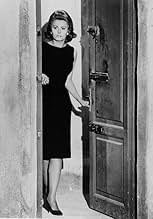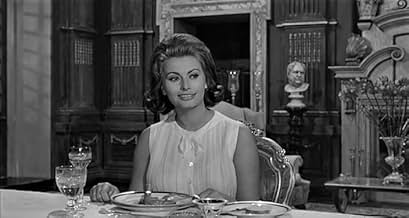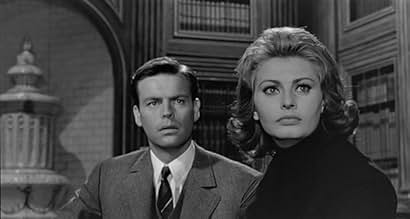अपनी भाषा में प्लॉट जोड़ेंA maddened German war criminal lives in a secluded house owned by his rich father who lets him think the war is still on 20 years after the fact.A maddened German war criminal lives in a secluded house owned by his rich father who lets him think the war is still on 20 years after the fact.A maddened German war criminal lives in a secluded house owned by his rich father who lets him think the war is still on 20 years after the fact.
- पुरस्कार
- 2 जीत और कुल 1 नामांकन
Carlo Antonini
- Police Official
- (बिना क्रेडिट के)
Antonia Cianci
- Maid
- (बिना क्रेडिट के)
Alfredo Franchi
- Groundskeeper
- (बिना क्रेडिट के)
Roberto Massa
- Chauffeur
- (बिना क्रेडिट के)
Osvaldo Peccioli
- Cook
- (बिना क्रेडिट के)
Lucia Pelella
- Groundskeeper's wife
- (बिना क्रेडिट के)
कहानी
क्या आपको पता है
- ट्रिवियाSpencer Tracy was offered but declined the role of Albrecht von Gerlach.
- गूफ़Nazi uniforms were banned after the war, yet Franz walks through the city without being arrested or beaten up. He gets a few strange looks but is otherwise ignored.
- इसके अलावा अन्य वर्जनEvery reference to National Socialism was cut from the West German version in 1962.
- कनेक्शनFeatured in Legendy mirovogo kino: Maximilian Schell
फीचर्ड रिव्यू
Perhaps because I saw this film dubbed in Italian with English subtitles and missed the familiar voices of Fredric March, Maximilian Schell, and Robert Wagner I was put off somewhat. But The Condemned Of Altona just did not rise to what I was expecting. Or maybe it was Jean-Paul Sartre's view of the world.
Whatever it was his ideas just did not translate well to the big screen. Meet the family Gerlach, father Fredric March big German industrial tycoon and his children Maximilian Schell, Robert Wagner, and Francoise Prevost. Germany may have lost the war, but her natural resources and the need for an anti-Communist bulwark in the Cold War have made her richer than ever, if de-Nazified.
March has been told he's terminally ill and has six months tops. He's troubled about his choices. The younger son Robert Wagner is not fit material for a tycoon and in the patriarchal society Francoise Prevost is out of the question.
Then there's Maximilian Schell who has self secluded and deluded. He's a wanted war criminal from World War II and he's imposed an exile on himself. He believes because he knows no better that Germany is a vast rubble.
Bringing him out of his exile is Wagner's new wife Sophia Loren who's been wondering about that locked section of that Gothic manor the Gerlachs have for themselves.
As for the rest all I can say is Schell's guilt is the engine that drives the rest of the film. The best part of the film is something that could not be done on stage. Schell finally lose and seeing with his own eyes, the prosperity and the bustling night life that was Hamburg. Wonder if he went to the clubs and found some musicians from Liverpool who would shake the world soon?
I did see this on stage at Lincoln Center a couple of years after the film had been made of Jean-Paul Sartre's play with George Coulouris heading the cast as the family patriarch. As he is often on screen, Coulouris was mesmerizing in self absorption and monomania about seeing his industrial complex carrying on. By contrast March seemed dull and lifeless and this has to rank as one of his lesser films. But not to single him out alone, the whole cast was the same way with the exception of Schell. But he's got the best part of a man who had to enlist in the army after his father got him off from protecting a Rabbi to a man who committed war atrocities on the Russian front.
Sartre was saying that war itself can make people do evil things. And that the true guilty parties never saw any punishment, on the contrary like March they triumphed in defeat.
In other words, what a world.
Whatever it was his ideas just did not translate well to the big screen. Meet the family Gerlach, father Fredric March big German industrial tycoon and his children Maximilian Schell, Robert Wagner, and Francoise Prevost. Germany may have lost the war, but her natural resources and the need for an anti-Communist bulwark in the Cold War have made her richer than ever, if de-Nazified.
March has been told he's terminally ill and has six months tops. He's troubled about his choices. The younger son Robert Wagner is not fit material for a tycoon and in the patriarchal society Francoise Prevost is out of the question.
Then there's Maximilian Schell who has self secluded and deluded. He's a wanted war criminal from World War II and he's imposed an exile on himself. He believes because he knows no better that Germany is a vast rubble.
Bringing him out of his exile is Wagner's new wife Sophia Loren who's been wondering about that locked section of that Gothic manor the Gerlachs have for themselves.
As for the rest all I can say is Schell's guilt is the engine that drives the rest of the film. The best part of the film is something that could not be done on stage. Schell finally lose and seeing with his own eyes, the prosperity and the bustling night life that was Hamburg. Wonder if he went to the clubs and found some musicians from Liverpool who would shake the world soon?
I did see this on stage at Lincoln Center a couple of years after the film had been made of Jean-Paul Sartre's play with George Coulouris heading the cast as the family patriarch. As he is often on screen, Coulouris was mesmerizing in self absorption and monomania about seeing his industrial complex carrying on. By contrast March seemed dull and lifeless and this has to rank as one of his lesser films. But not to single him out alone, the whole cast was the same way with the exception of Schell. But he's got the best part of a man who had to enlist in the army after his father got him off from protecting a Rabbi to a man who committed war atrocities on the Russian front.
Sartre was saying that war itself can make people do evil things. And that the true guilty parties never saw any punishment, on the contrary like March they triumphed in defeat.
In other words, what a world.
- bkoganbing
- 22 जून 2013
- परमालिंक
टॉप पसंद
रेटिंग देने के लिए साइन-इन करें और वैयक्तिकृत सुझावों के लिए वॉचलिस्ट करें
- How long is The Condemned of Altona?Alexa द्वारा संचालित
विवरण
- रिलीज़ की तारीख़
- कंट्री ऑफ़ ओरिजिन
- भाषाएं
- इस रूप में भी जाना जाता है
- The Condemned of Altona
- फ़िल्माने की जगहें
- उत्पादन कंपनियां
- IMDbPro पर और कंपनी क्रेडिट देखें
बॉक्स ऑफ़िस
- US और कनाडा में सकल
- $23,98,000
- चलने की अवधि1 घंटा 54 मिनट
- रंग
- ध्वनि मिश्रण
- पक्ष अनुपात
- 2.35 : 1
इस पेज में योगदान दें
किसी बदलाव का सुझाव दें या अनुपलब्ध कॉन्टेंट जोड़ें


























